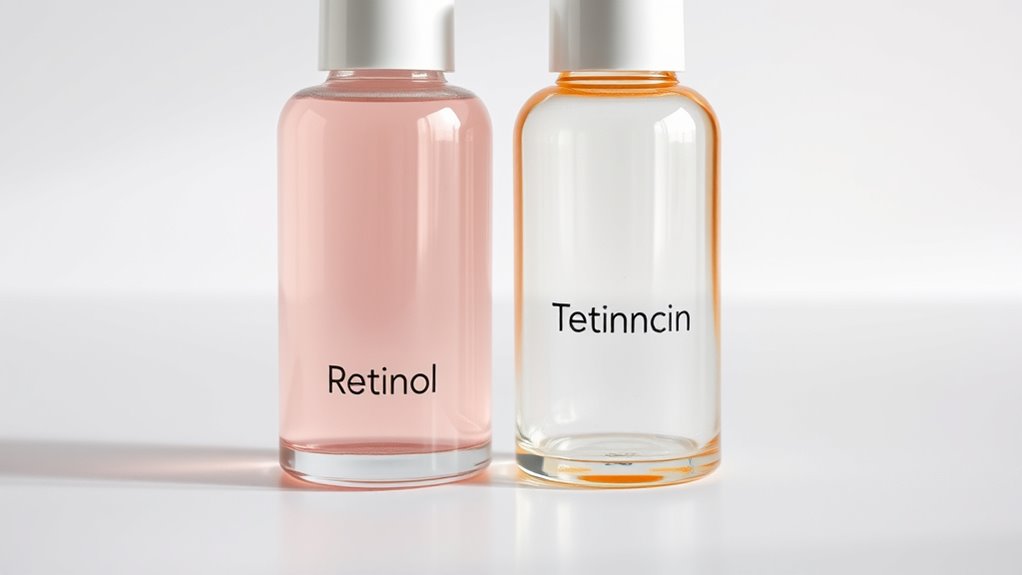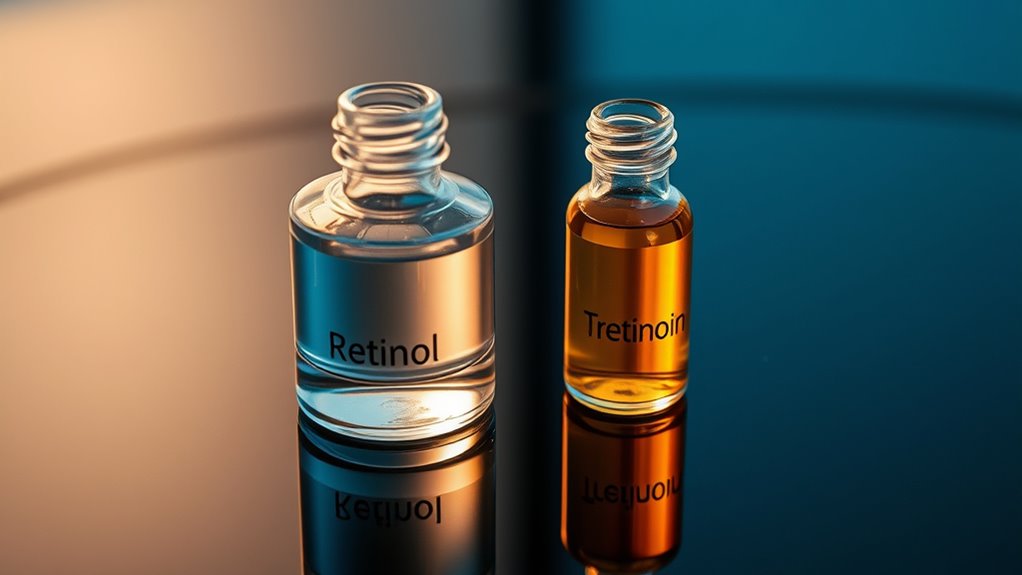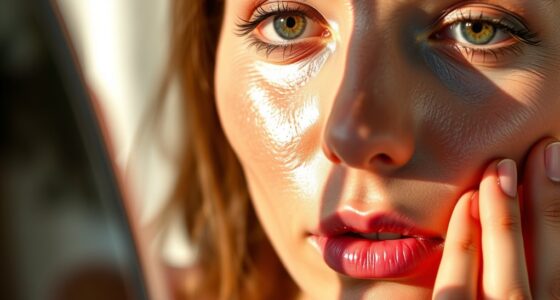Retinol and tretinoin both come from vitamin A, but tretinoin is stronger and requires a prescription, making it more potent for quick results. Retinol is milder, needs regular application, and is more stable when stored properly, ideal for sensitive skin or beginners. Tretinoin can cause irritation and should be used under dermatological supervision. Understanding these differences helps you choose what’s best for your skin goals—more details await to guide your decision.
Key Takeaways
- Tretinoin is a prescription-strength, more potent retinoid, while retinol is milder and available over-the-counter.
- Tretinoin offers faster, more noticeable results due to its higher potency; retinol requires consistent use over time.
- Retinol is less chemically stable, needing proper storage to maintain effectiveness, whereas tretinoin is more stable.
- Tretinoin can cause more initial irritation, often requiring dermatologist supervision; retinol is gentler and suitable for sensitive skin.
- Regular application frequency differs: retinol is used more often, while tretinoin’s stability allows for less frequent, controlled use.

Are retinol and tretinoin truly different, or just different names for similar ingredients? While both are derivatives of vitamin A and share many benefits, they differ markedly in their chemical stability and how you should use them. Retinol, a milder, over-the-counter option, is less chemically stable than tretinoin. Its molecular structure makes it more prone to degradation when exposed to light, air, and heat. That means it can lose potency over time if not stored properly. Because of this, retinol often requires more frequent application or higher concentrations to achieve noticeable results, especially in the early stages of skincare. Tretinoin, on the other hand, is a prescription-strength retinoid that’s been chemically stabilized for more consistent performance. Its stability allows for more reliable results with less frequent application, assuming your skin tolerates it well.
When considering usage frequency, retinol generally needs to be applied more often—sometimes nightly or every other night—because it’s gentler and less potent. You might find that retinol causes fewer immediate side effects like irritation or dryness, making it suitable for daily use in many cases. However, because it’s less stable, its effectiveness can diminish if not stored correctly or if exposed to environmental factors, which might mean you need to reapply more frequently or use higher amounts to see the same benefits as tretinoin. Tretinoin, being more chemically stable, works effectively at lower doses and less frequent applications, often once a night or every other night, depending on your skin’s tolerance. Its stability ensures a more predictable response, but it can also cause more irritation initially, so many users start slowly.
Despite the differences in stability and usage, both retinol and tretinoin target similar skin concerns: acne, fine lines, and skin texture. The main distinction lies in strength and how your skin responds. Tretinoin’s higher potency often translates to faster results, but it also requires careful monitoring by a dermatologist to avoid adverse effects. Retinol, while gentler, might take longer to show visible improvements but offers a safer starting point for sensitive skin or those new to retinoids. Ultimately, understanding the chemical stability helps you grasp why these two ingredients have different usage guidelines and effectiveness timelines. Whether you opt for retinol or tretinoin, knowing these key differences enables you to tailor your skincare routine for ideal results.
Frequently Asked Questions
Can Retinol Be Used During Pregnancy?
You should avoid using retinol during pregnancy because of its potential risks. It’s not considered pregnancy-safe, and retinol restrictions are in place because high doses can harm the developing baby. Even topical retinol might be absorbed in small amounts, so it’s best to consult your doctor before using any retinoid products. Prioritize your safety and choose pregnancy-safe skincare options during this important time.
How Long Does Tretinoin Take to Show Results?
You’ll typically see tretinoin’s results within 8 to 12 weeks, but skin absorption and individual treatment duration can influence this timeline. Consistent use is key, and you might notice improvements in skin texture and acne before full benefits appear. Keep in mind, patience is essential, as tretinoin works gradually. Regular follow-ups with your dermatologist help monitor progress and adjust application as needed for ideal results.
Are There Any Age Restrictions for Using Retinol?
They say, “age is just a number,” but your skin’s maturity matters when using retinol. Generally, there are no strict age restrictions for retinol, but it’s best for adults with developing or mature skin. If you’re under 18, consult a dermatologist before starting. Retinol can be beneficial at any age, but understanding your skin’s needs helps prevent irritation and guarantees safe, effective use as you age gracefully.
Can Retinol Cause Photosensitivity?
Yes, retinol can cause sun sensitivity, making your skin more prone to damage from UV rays. When you use retinol, your skin becomes more vulnerable to sun damage, so it’s crucial to apply a broad-spectrum sunscreen daily. Protecting your skin from the sun helps prevent skin damage and reduces the risk of irritation or worsening of side effects caused by retinol. Always be cautious and limit sun exposure while using retinol products.
Is Tretinoin Safe for Sensitive Skin Types?
Tretinoin can be safe for sensitive skin if you choose a gentle formulation and strengthen your skin barrier first. It’s important to start with lower concentrations and use it gradually. You should also look for products formulated with soothing ingredients to reduce irritation. Always patch-test new products and consult a dermatologist to tailor the treatment to your skin’s needs, especially if you have sensitive or compromised skin.
Conclusion
So, now that you know the key differences between retinol and tretinoin, which one will you choose for your skincare routine? Both have their benefits, but understanding your skin’s needs and your goals can help you make the right decision. Are you ready to embrace the power of retinoids and achieve healthier, younger-looking skin? Remember, patience and consistency are your best allies on this journey.









